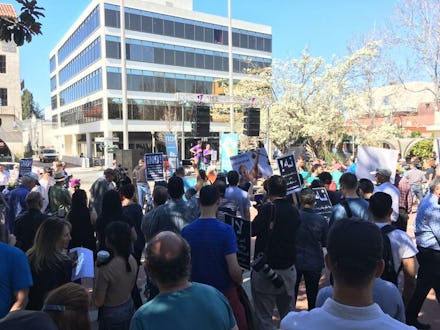Opposition to Trump unites Silicon Valley's white- and blue-collar workers

PALO ALTO, Calif. — Scattered among the programmers and engineers at Tech Stands Up's Pi Day rally was another kind of tech worker: the janitors, cafeteria workers and security guards who keep those tech companies running.
"They are just as much a part of making our industry move as the engineers are," said Brad Taylor, a software engineer at Optimizely and founder of Tech Stands Up, a group of tech employees "giving a voice to the rapidly growing concerns about the current administration's policies."
Coming on the heels of Google employees' January walkout to protest Trump's immigration ban and high-profile exits from tech companies advising the administration, the rally drew an estimated 1,000 participants from across the Bay Area in support of "inclusion, diversity and civil liberties." The demonstration was held on Pi Day at 2 p.m. — a "nerd holiday," as one participant put it — under blossoming trees at Palo Alto City Hall.
Speaking alongside executives from LinkedIn, Aspiration and Hipmunk, Maria Gonzales, a unionized janitor at Facebook whose daughter is a DREAMer, and Arturo S. Rodriguez, president of the United Farm Workers, represent an emerging alliance on tech campuses between white-collar tech workers and contract service employees.
Gonzalez teared up as she described living with the fear that her daughter, a recent graduate of nursing school, could be deported.
"We are honest people. We work hard for this country. We wanted opportunity for our children, and that's why we immigrated here," she said.
The common experience of immigration has served as a uniting force for white- and blue-collar workers in the industry.
"I have plenty of colleagues who are engineers but whose parents are service workers because they immigrated here," said Mark Rose, an organizer of the rally and product leader at Nest.
Organizers saw momentum against Trump as an opportunity to motivate their co-workers, not just around national issues but concerns much closer to home, like wages and benefits for lower-wage workers. An explicit goal of the event was to help "bridge the divide between the tech industry and people that technology has disrupted."
"Historically, the tech industry has not been friendly to labor."
Skyrocketing rent has pushed huge numbers of low-income residents out of the Bay Area. In San Jose, middle class households are 77% more likely to leave the city than to settle there. In Mountain View, home to Google, rent has jumped 54% in the last five years. Contract service employees make, on average, $19,900 per year, compared with $113,300 for direct tech employees.
Historically, the tech industry has not been friendly to labor, and some say an anti-union ethos is part of the fabric of Silicon Valley. Cafeteria workers at Intel won a long battle to unionize in 2016. Amazon has brought in anti-labor lawyers to shut down organizing at its fulfillment centers.
The Tech Workers Coalition — a group of tech workers that supports organized labor— has partnered with unions like SEIU-USWW and UNITE-HERE to build relationships between white-collar workers and support and service employees, but their work is still in its early stages.
"One experiment we're starting is to find employees where they are and organize small groups of people who are already interested in doing progressive work," said Matt Schaefer, an engineer at Loconomics and a member of the Tech Workers Coalition. "Then we can start tying them together so they can learn from each other."
Maria Breaux, a copy writer at Marin Software, didn't expect unionized service employees to be part of the event.
"It's wonderful," she said. "It's important to hear the voices of people who've been displaced from the area."
Jacky Espinoza, a barista at Cisco from the east side of San Jose whose family is fighting a rent increase, has noticed a big difference at work since the UNITE-HERE union was recognized.
"It helps you have a voice with your workers and managers," she said. "They listen to you more."
Ares Geovantos, a research scientist at Agilent Labs and a member of the Tech Workers Coalition, sees a natural affinity between white- and blue-collar tech workers.
"You don't want to be getting food every day from someone who's being exploited or has to drive three hours to find housing they can afford and can't pay for health insurance," he said.
A "Muslim ban" would have a direct impact on both tech companies' ability to hire workers and users of their products, but convincing highly paid tech workers to care about issues like affordable health care is harder.
"It will be important for us to put that pressure internally, to stick up for things that don't necessarily affect our bottom line," Taylor said. He cited Apple's opposition to Trump's rollback of protections for transgender students as the type of political action workers could push their employers to take.
Sought-after tech employees might have more power than they realize, and Tech Stands Up wants them to use that power for good.
"You can start asking questions when you go for a job interview: 'What is your social contract with the community?' Instead of asking questions like 'How many ping pong tables do you have?'" Taylor said.
Tech employees can give their leaders an excuse to speak out.
"CEOs and executive teams might say, 'My hands are tied, but if 80% of my employees want me to do this, I have to do this.' So we can give them the ammunition they may need," Rose said.
If nothing else, tech companies have a practical reason to take action on local inequality. Taylor anticipates that driverless cars, 3-D printing and automation will put thousands of people out of work in the next decade, provoking anger at the tech industry.
"While the pitchforks may be pointed at D.C., if we don't do something, they're going to be pointed right at us," he said.